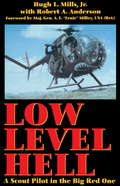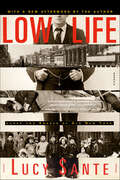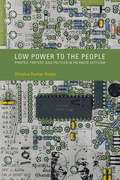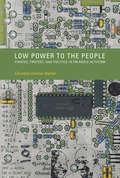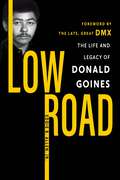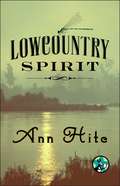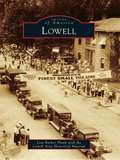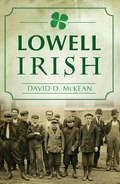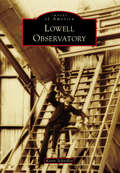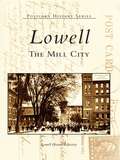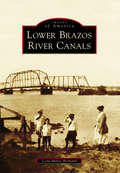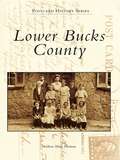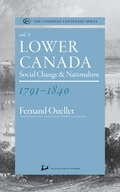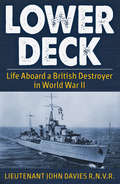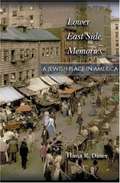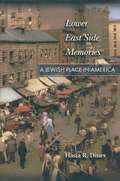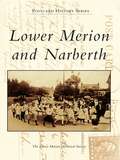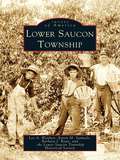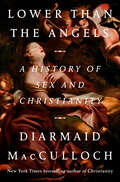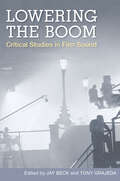- Table View
- List View
Low Level Hell: A Scout Pilot in the Big Red One
by Hugh MillsThe aeroscouts of the 1st Infrantry Division had three words emblazoned on their unit patch: Low Level Hell. This was the perfect definition of what these pilots experienced as the ranged the skies of Vietnam. Mills tells the combat experiences of these aviators.
Low Life: Lures and Snares of Old New York
by Lucy SanteThe classic social history of corruption and vice in nineteenth-century NYC: “A cacophonous poem of democracy and greed, like the streets of New York themselves” (John Vernon, Los Angeles Times Book Review).Lucy Sante’s Low Life is a portrait of America’s greatest city, the riotous and anarchic breeding ground of modernity. This is not the familiar saga of mansions, avenues, and robber barons, but the messy, turbulent, often murderous story of the city’s slums; the teeming streets—scene of innumerable cons and crimes whose cramped and overcrowded housing is still a prominent feature of the cityscape.Low Life voyages through Manhattan from four different directions. Part One examines the actual topography of Manhattan from 1840 to 1919; Part Two, the era’s opportunities for vice and entertainment—theaters and saloons, opium and cocaine dens, gambling and prostitution; Part Three investigates the forces of law and order which did and didn’t work to contain the illegalities; Part Four counterposes the city’s tides of revolt and idealism against the city as it actually was.Low Life is one of the most provocative books about urban life ever written—an evocation of the mythology of the quintessential modern metropolis, which has much to say not only about New York’s past but about the present and future of all cities.
Low Power to the People
by Christina Dunbar-HesterThe United States ushered in a new era of small-scale broadcasting in 2000 when it began issuing low-power FM (LPFM) licenses for noncommercial radio stations around the country. Over the next decade, several hundred of these newly created low-wattage stations took to the airwaves. In Low Power to the People, Christina Dunbar-Hester describes the practices of an activist organization focused on LPFM during this era. Despite its origins as a pirate broadcasting collective, the group eventually shifted toward building and expanding regulatory access to new, licensed stations. These radio activists consciously cast radio as an alternative to digital utopianism, promoting an understanding of electronic media that emphasizes the local community rather than a global audience of Internet users.Dunbar-Hester focuses on how these radio activists impute emancipatory politics to the "old" medium of radio technology by promoting the idea that "microradio" broadcasting holds the potential to empower ordinary people at the local community level. The group's methods combine political advocacy with a rare commitment to hands-on technical work with radio hardware, although the activists' hands-on, inclusive ethos was hampered by persistent issues of race, class, and gender. Dunbar-Hester's study of activism around an "old" medium offers broader lessons about how political beliefs are expressed through engagement with specific technologies. It also offers insight into contemporary issues in media policy that is particularly timely as the FCC issues a new round of LPFM licenses.
Low Power to the People: Pirates, Protest, and Politics in FM Radio Activism (Inside Technology)
by Christina Dunbar-HesterAn examination of how activists combine political advocacy and technical practice in their promotion of the emancipatory potential of local low-power FM radio.The United States ushered in a new era of small-scale broadcasting in 2000 when it began issuing low-power FM (LPFM) licenses for noncommercial radio stations around the country. Over the next decade, several hundred of these newly created low-wattage stations took to the airwaves. In Low Power to the People, Christina Dunbar-Hester describes the practices of an activist organization focused on LPFM during this era. Despite its origins as a pirate broadcasting collective, the group eventually shifted toward building and expanding regulatory access to new, licensed stations. These radio activists consciously cast radio as an alternative to digital utopianism, promoting an understanding of electronic media that emphasizes the local community rather than a global audience of Internet users.Dunbar-Hester focuses on how these radio activists impute emancipatory politics to the “old” medium of radio technology by promoting the idea that “microradio” broadcasting holds the potential to empower ordinary people at the local community level. The group's methods combine political advocacy with a rare commitment to hands-on technical work with radio hardware, although the activists' hands-on, inclusive ethos was hampered by persistent issues of race, class, and gender.Dunbar-Hester's study of activism around an “old” medium offers broader lessons about how political beliefs are expressed through engagement with specific technologies. It also offers insight into contemporary issues in media policy that is particularly timely as the FCC issues a new round of LPFM licenses.
Low Road: The Life and Legacy of Donald Goines
by Eddie B. Allen, Jr. Jr.FOREWORD FROM THE LATE RAPPER DMXThe riveting biography of Donald Goines—one of the most authentic Black voices in American fiction—that explores the raw world of the street-smart literary icon and his remarkable legacy in the fifty years since his tragic death.Born in post-Depression era Detroit to a stable, Catholic, two-parent household, and heir to the family business, Donald Goines was instead drawn to the streets and to the dangerous lure of The Life. No writer would end up capturing it quite like Goines. He knew the hustle intimately: bootlegging, pimping, drugs, prostitutes, gambling, and prison. Inspired by the revolutinary author, Iceberg Slim, Donald drew on his own experiences to drop an astonishing sixteen bestselling novels in three short years, including Whoreson, Dopefiend, Daddy Cool, and Never Die Alone. Ironically, the criminal world that infused Goines&’s brilliant, uncompromised, and redemptive outlet would be the same one to finally snuff him out.In this in-depth and updated biography, culled from personal letters, treatments from unwritten books, photographs, and interviews with family members, Eddie B. Allen, Jr. commerorates not only Goines&’s compelling life—from his stint in the Air Force as a teen to his criminal career to cult author status—but Goines&’s lasting legacy as well. One that resounds with new generations, many of whom are discovering for the first time that he was a true original.
Low fertility in Europe
by Jack Clift Stijn Hoorens Stephanie Diepeveen Laura Staetsky Barbara JantaRecent statistics suggest that fertility in Europe shows signs of recovery after decades of year-on-year drops. This report updates a study on low fertility from 2004 and explores the extent, causes and consequences of the recent recovery.
Lowcountry Spirit
by Ann HiteA haunting historical eNovella about three slave girls with mystical powers living on an eerie island off the coast of Georgia, whose lives intertwine in their quest for freedom.Meet Emmaline, Celestia, and Liza, three slave girls on a haunted barrier island in Georgia lowcountry. Emmaline is a mouthy, stubborn young woman who has magic in her blood and conjures the strongest spells with hardly any effort. Celestia was ten when her mother was sold and taken from the island. She's never stopped longing for her, even when the talking chain--a verbal underground railroad--sends word that her mother has been taken to a plantation in North Carolina. By the time she turns sixteen, she can no longer bring her mother's face to mind, but she can still hear her urging Celestia to be thankful and keep safe. Liza was a birthday gift to the plantation's mistress. Her mama was killed for throwing a spell on her master. Before she died she gave Liza her book of conjures, so she could protect herself. And when Liza hatches a plan for all three of them to escape, the three girls' lives collide. What they don't realize is that their chances of successfully escaping are slim, and the possibility that all three will die before they leave the island is more likely...
Lowell
by Lisa Barker Plank Lowell Area Historical MuseumSettlement of the Lowell area centered on the confluence of the Grand and Flat Rivers. Joseph and Magdaleine LaFramboise first established a fur trading post near the Ottawa village, Segwun, where the rivers meet. The community grew as settlers poured into the area attracted by the growing lumber industry and rich farmland. Diverse businesses emerged including a cutter factory, a vibrant clamming industry, and the state's oldest family-run flour mill. A unique feature of the area is Fallasburg Historic Village. Once an active mill town on the Flat River, Fallasburg slid into obscurity when the railroad passed it by. At the height of the Great Depression, businessmen of Lowell joined together to build a showboat to draw visitors to town. The Lowell Showboat is now one of the most recognizable attractions in Lowell. This book explores both well known and more obscure aspects of Lowell's history through a wealth of images, many never published before.
Lowell
by Richard P. Howe Jr.Lowell, Massachusetts, stands apart as an exceptional city. Bursting onto the scene in the 1820s, Lowell quickly became the workshop of America, powered by the mighty Merrimack River and staffed by tens of thousands of immigrants. Even as the mill era faded, people from around the world kept coming to live and work in Lowell. In the 1970s, community leaders imagined a new Lowell built on its legendary past and echoing its early innovation, a renewed city that is now a global model for urban revitalization. Since then, more than 400 buildings have been preserved, and the city has become a hub of higher education, a center for the arts, and home to a National Historical Park. This remarkable transformation has been fueled by the cultural vitality of its people, which is continuously refreshed by new arrivals from every corner of the globe.
Lowell Irish: Stories & Accounts Of Lowell's Early Irish (American Heritage)
by David D. MckeanIrish immigrants streamed into the mills of Lowell, Massachusetts, at the start of the Industrial Revolution, fleeing poverty and later the Great Hunger. Irish families established a neighborhood called the Acre, and some rose to roles as successful business owners who shaped the history of their new home. Hugh Cummiskey emigrated from Northern Ireland to become a powerful work gang leader and businessman who in turn hired newly arrived immigrants. The first recorded celebrations of St. Patrick's Day began in 1833, as new residents celebrated their Irish roots and American future with traditional music and parades. Today, the community still honors its Irish history. From tales of politicians and entrepreneurs to the everyday struggles of the average immigrant, author David McKean traces the history of the pioneer members who established Lowell as an industrial powerhouse.
Lowell Observatory: A History Of Discovery At Flagstaff (Images of America)
by Kevin SchindlerAtop a mesa one mile west of downtown Flagstaff, Arizona, sits Lowell Observatory, an astronomical research facility steeped in tradition. Percival Lowell, scion of a Boston Brahmin family, initially established his observatory in 1894 to study the possibility of intelligent life on Mars. Lowell widely popularized his controversial theories, sparking debate among both the scientific community and lay public. In the following years, the observatory's astronomers made several discoveries that dramatically altered our understanding of space, including Clyde Tombaugh's discovery of Pluto in 1930 and V.M. Slipher's detection of the expanding nature of the universe in 1912. Decades later, Apollo astronauts visited as part of their training to fly to the moon. These stories and others offer a glimpse of the scientific discovery, community pride, and personal triumph that define Lowell Observatory.
Lowell: The Mill City
by Lowell Historical SocietyFrom its birth in 1826, Lowell has thrived, declined, and been resurrected as a mill city. Today, it is celebrated for its rich history. These postcards from the 1890s to the 1940s display the energy of this industrial city and its native andimmigrant population as it grew, built, worked, and played. Vintage cards capture both familiar mills along the Merrimack River and vanished businesses. Coupled with compelling narrative, they tell stories of a horse-drawn fire engine, textile mill workers, grand civic buildings, floods,and even the aftermath of an explosion.
Lowell: The River City
by Lowell Historical SocietyLowell, a historic industrial city, owes its life to the broad Merrimack River. Renowned for its water-powered textile mills, it was also a city rich in natural beauty, where spiritual and cultural values took root. Postcards from the 1890s to the 1940s bear witness to riverscapes, varied waterways, arched bridges, and green parks. Vintage cards depict grand churches and stately mansions, some now altered or gone, and rare interior views. Informative text accompanies the images of yellowbricked colleges, pastoral neighboring environs, dignified cemeteries, and imposing monuments, such as the captivating Lion Monument.
Lower Brazos River Canals
by Lora-Marie BernardCommunities have spent more than 100 years mastering the mighty Brazos River and its waterways. In the 1800s, Stephen F. Austin chose the Brazos River as the site for the first Texas colony because of its vast water and fertile soil. Within 75 years, a pumping station would herald the way for crop management. A sugar mill that was eventually known as Imperial Sugar spurred community development. In 1903, John Miles Frost Jr. tapped the Brazos to expand the Cane and Rice Belt Irrigation System while Houston newspapers predicted the infrastructure marvel would change the region's future--and it did. Within a few decades, the Texas agricultural empire caused Louisiana to dub Texas farmers "the sugar and rice aristocracy." As the dawn of the industrial age began, the Brazos River and its waterways began supplying the Texas Gulf Coast industry.
Lower Bucks County (Postcard History)
by Andrew Mark HermanNamed by William Penn in 1681, Bucks County is one of the three original counties in Pennsylvania and enjoys a lengthy tradition as an important region of this state. Lower Bucks County is a fascinating pictorial history of the towns that comprise the northern suburban edge of Philadelphia. Surveying the era from 1905 to 1970, the book includes images from the towns of Langhorne, Hulmeville, Trevose, Southampton, Newtown, Tullytown, Richboro, Churchville, Holland, Cornwells Heights, Fallsington, Yardley, Feasterville, Bristol, Oxford Valley, Parkland, and Andalusia. Lower Bucks County portrays the natural beauty of the area's scenery, as well as historic homes, hotels, stores, and schools. Several prominent families are also chronicled, as the county evolves into the bustling communities of today.
Lower Canada 1791-1840: Social Change & Nationalism
by Patricia Claxton Fernand OuelletTranslated and adapted by Patricia ClaxtonVolume VIII of the Canadian Centenary Series Now available as e-books for the first time, the Canadian Centenary Series is a comprehensive nineteen-volume history of the peoples and lands which form Canada. Although the series is designed as a unified whole so that no part of the story is left untold, each volume is complete in itself.Professor Ouellet traces the impact of some of the changes wrought in Lower Canada at the close of the eighteenth century, after thirty years of British rule, to offer an analysis of the historical roots of nationalism and the traditional struggle for social change in the province of Quebec. First published in 1980, Fernand Ouellet's important contribution to the Canadian Centenary Series is available here as an e-book for the first time.
Lower Chattahoochee River
by The Columbus Museum Historic Chattahoochee CommissionThe Chattahoochee River has dramatically shaped the heritage of the lower Chattahoochee Valley of east and southeast Alabama and west and southwest Georgia. As the region's dominant geographic feature, the Chattahoochee has served residents of the area as an engine for commerce and as an important transportation route for centuries. It has also been a natural and recreational resource, as well as an inspiration for creativity. From the stream's role as one of the South's busiest trade routes to the dynamic array of water-powered industry it made possible, the river has been at the very center of the forces that have shaped the unique character of the area. A vital part of the community's past, present, and future, it binds the Chattahoochee Valley together as a distinctive region. Through a variety of images, including historic photographs, postcards, and artwork, this book illustrates the importance of the Chattahoochee River to the region it has helped sustain.
Lower Deck: Life Aboard a British Destroyer in WWII
by Lieutenant John DaviesLower Deck, first published in 1945, is a journal-like, exciting recounting of life aboard a Royal Navy destroyer, the H.M.S. Sikh (due to wartime regulations, the ship’s name in the book is the H.M.S. Skye); the ship is stationed in the eastern Mediterranean in the defense of Malta. Centering on the lives of the crewmen who are part of a gun crew, the book portrays the ship’s almost daily encounters with German and Italian ships and planes (as the author states: “...Daylight each morning brings with it almost complete certainty of attack...the comparatively confined waters, the proximity and strategic excellence of Axis air bases, means that to avoid discovery and attack is virtually impossible.”) Eventually, the Skye’s luck runs out and on September 14, 1942, she is sunk by German artillery with the loss of 115 men, with more men taken prisoner, and others rescued by nearby friendly ships. Includes a Glossary of naval terms used in the book.
Lower East Side Memories: A Jewish Place In America
by Hasia R. DinerManhattan's Lower East Side stands for Jewish experience in America. With the possible exception of African-Americans and Harlem, no ethnic group has been so thoroughly understood and imagined through a particular chunk of space. Despite the fact that most American Jews have never set foot there--and many come from families that did not immigrate through New York much less reside on Hester or Delancey Street--the Lower East Side is firm in their collective memory. Whether they have been there or not, people reminisce about the Lower East Side as the place where life pulsated, bread tasted better, relationships were richer, tradition thrived, and passions flared. This was not always so. During the years now fondly recalled (1880-1930), the neighborhood was only occasionally called the Lower East Side. Though largely populated by Jews from Eastern Europe, it was not ethnically or even religiously homogenous. The tenements, grinding poverty, sweatshops, and packs of roaming children were considered the stuff of social work, not nostalgia and romance. To learn when and why this dark warren of pushcart-lined streets became an icon, Hasia Diner follows a wide trail of high and popular culture. She examines children's stories, novels, movies, museum exhibits, television shows, summer-camp reenactments, walking tours, consumer catalogues, and photos hung on deli walls far from Manhattan. Diner finds that it was after World War II when the Lower East Side was enshrined as the place through which Jews passed from European oppression to the promised land of America. The space became sacred at a time when Jews were simultaneously absorbing the enormity of the Holocaust and finding acceptance and opportunity in an increasingly liberal United States. Particularly after 1960, the Lower East Side gave often secularized and suburban Jews a biblical, yet distinctly American story about who they were and how they got here. Displaying the author's own fondness for the Lower East Side of story books, combined with a commitment to historical truth, Lower East Side Memories is an insightful account of one of our most famous neighborhoods and its power to shape identity.
Lower East Side Memories: A Jewish Place in America
by Hasia R. DinerManhattan's Lower East Side stands for Jewish experience in America. With the possible exception of African-Americans and Harlem, no ethnic group has been so thoroughly understood and imagined through a particular chunk of space. Despite the fact that most American Jews have never set foot there--and many come from families that did not immigrate through New York much less reside on Hester or Delancey Street--the Lower East Side is firm in their collective memory. Whether they have been there or not, people reminisce about the Lower East Side as the place where life pulsated, bread tasted better, relationships were richer, tradition thrived, and passions flared. This was not always so. During the years now fondly recalled (1880-1930), the neighborhood was only occasionally called the Lower East Side. Though largely populated by Jews from Eastern Europe, it was not ethnically or even religiously homogenous. The tenements, grinding poverty, sweatshops, and packs of roaming children were considered the stuff of social work, not nostalgia and romance. To learn when and why this dark warren of pushcart-lined streets became an icon, Hasia Diner follows a wide trail of high and popular culture. She examines children's stories, novels, movies, museum exhibits, television shows, summer-camp reenactments, walking tours, consumer catalogues, and photos hung on deli walls far from Manhattan. Diner finds that it was after World War II when the Lower East Side was enshrined as the place through which Jews passed from European oppression to the promised land of America. The space became sacred at a time when Jews were simultaneously absorbing the enormity of the Holocaust and finding acceptance and opportunity in an increasingly liberal United States. Particularly after 1960, the Lower East Side gave often secularized and suburban Jews a biblical, yet distinctly American story about who they were and how they got here. Displaying the author's own fondness for the Lower East Side of story books, combined with a commitment to historical truth, Lower East Side Memories is an insightful account of one of our most famous neighborhoods and its power to shape identity.
Lower East Side Oral Histories: Interviews by Nina Howes
by Eric Ferrara and Nina HowesA collection of personal memories and insights from 25 longtime residents of this storied and ever-changing NYC neighborhood. The Lower East Side is one of Manhattan&’s most vibrant neighborhoods. For centuries, it has been home to hundreds of enclaves of immigrants from every part of the world. As they became New Yorkers, the neighborhood has in turn become infused with their cultures, foods, traditions, and personalities. In this book, local historians Eric Ferrara and Nina Howes document the stories and remembrances of twenty-five Lower East Side residents who helped make it what it is today. From childhood memories with family (but without running water) to observations of the constantly changing city, Lower East Side Oral Histories reveals this larger-than-life corner of New York through the eyes and voices of the people who lived there.
Lower Merion and Narberth (Postcard History)
by The Lower Merion Historical SocietyFirst settled in 1682 by William Penn's coterie of Welsh Quakers, the Lower Merion area has since undergone several transformations: from farmland, to the home of Philadelphia's industrial elite, to built-out suburb. Besides the development of the unique and impressive Main Line mansions for which the area is famous, Lower Merion and Narberth have been the scene of dramatic railroad rivalries and advances for the middle class. Lower Merion and Narberth focuses on the era of the most intense development, between 1900 and 1950, when the character of each individual neighborhood was coming into its own.
Lower Saucon Township (Images of America)
by Karen M. Samuels Lee A. Weidner Barbara J. Ryan Lower Saucon Township Historical SocietyLower Saucon Township provides a unique glimpse of the region's many diverse villages and the German immigrant population. Towns including Wassergass, Shimersville, Polk Valley, Redington, and Bingen were settled largely because of the area's fertile soil, abundant water, and many iron and limestone deposits, which contributed to surrounding communities such as Bethlehem and Hellertown both socially and economically. These rare family photographs depict a blend of lives that influenced the area before and after the industrial revolution.
Lower than the Angels: A History of Sex and Christianity
by Diarmaid MacCulloch"An epic tale, and MacCulloch is an undaunted guide.&”—New York Review of Books A groundbreaking history of sexual emotion, sexual activity, gender relations, marriage and the family--and how Christianity has interacted with this panorama of human concernsFew matters produce more public interest and public anxiety than sex and religion. Much of the political contention and division in societies across the world centres on sexual topics, and one-third of the global population is Christian in background or outlook. The issue goes to the heart of present-day religion.This book seeks to calm fears and encourage understanding through telling a three-thousand-year-long tale of Christians encountering sex, gender, and the family. The message of Lower than the Angels is simple, necessary and timely: to pay attention to the complexity and contradictions in the history of Christianity. The reader can decide from the story told here whether there is a single Christian theology of sex, or many contending voices in a symphony that is not at all complete. Oxford&’s Emeritus Professor of the History of the Church introduces an epic of ordinary and extraordinary Christians trying to make sense of themselves and of humanity&’s deepest desires, fears and hopes.
Lowering the Boom: Critical Studies in Film Sound
by Jay BeckAs the first collection of new work on sound and cinema in over a decade, Lowering the Boom addresses the expanding field of film sound theory and its significance in rethinking historical models of film analysis. The contributors consider the ways in which musical expression, scoring, voice-over narration, and ambient noise affect identity formation and subjectivity. Lowering the Boom also analyzes how shifting modulation of the spoken word in cinema results in variations in audience interpretation. Introducing new methods of thinking about the interaction of sound and music in films, this volume also details avant-garde film sound, which is characterized by a distinct break from the narratively based sound practices of mainstream cinema. This interdisciplinary, global approach to the theory and history of film sound opens the eyes and ears of film scholars, practitioners, and students to film's true audio-visual nature. Contributors are Jay Beck, John Belton, Clark Farmer, Paul Grainge, Tony Grajeda, David T. Johnson, Anahid Kassabian, David Laderman, James Lastra, Arnt Maasø, Matthew Malsky, Barry Mauer, Robert Miklitsch, Nancy Newman, Melissa Ragona, Petr Szczepanik, Paul Théberge, and Debra White-Stanley.
